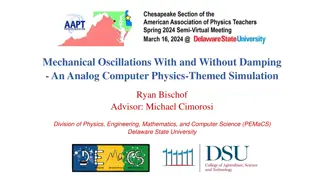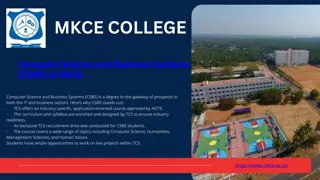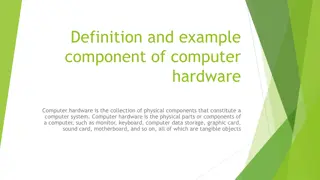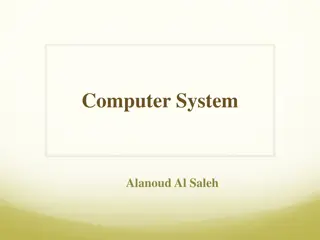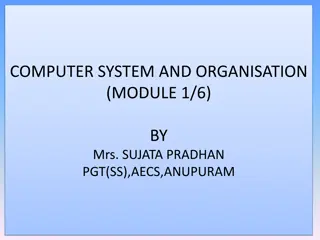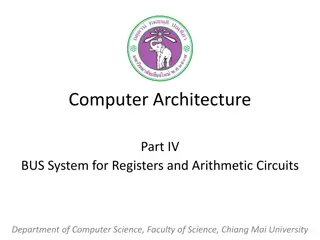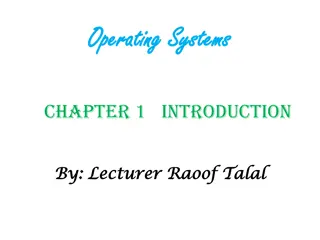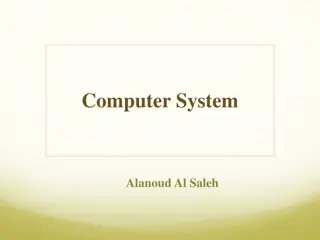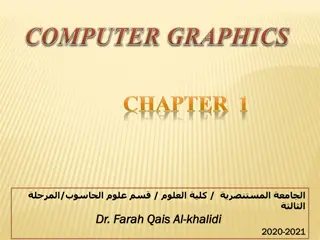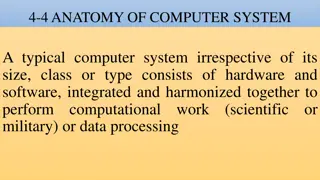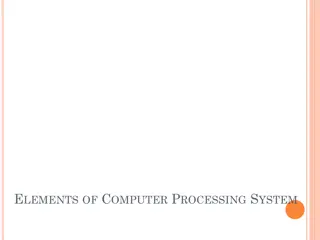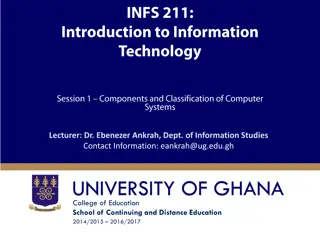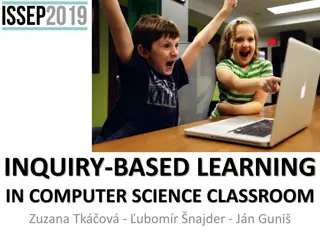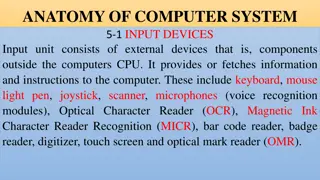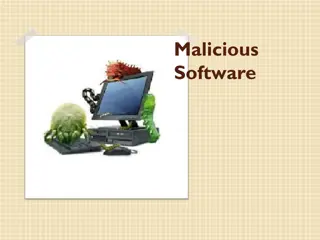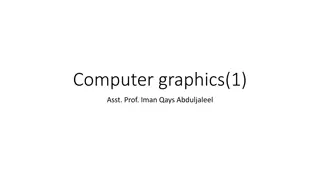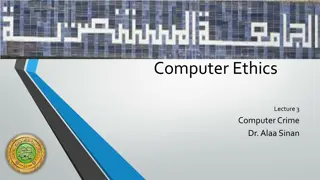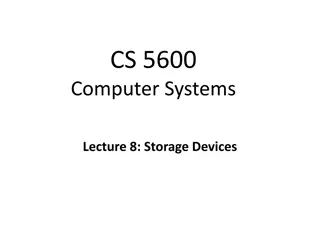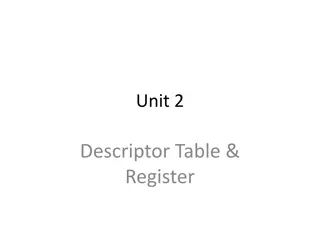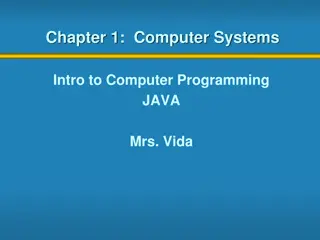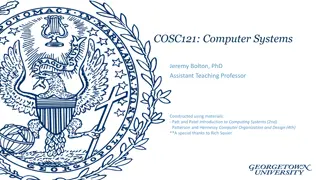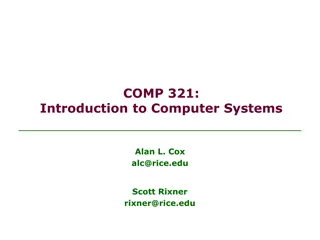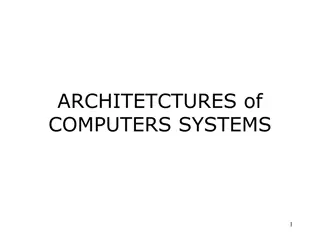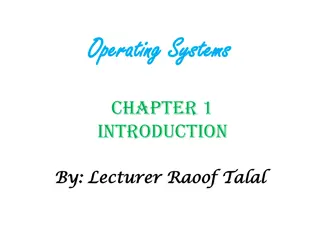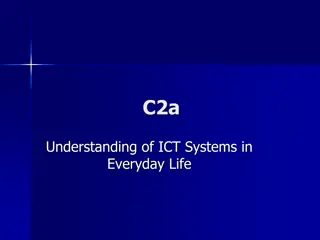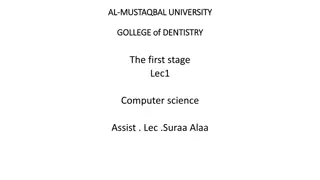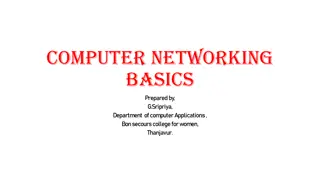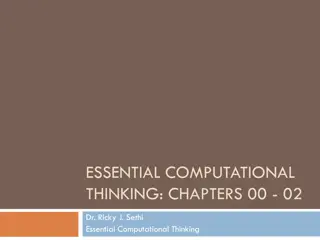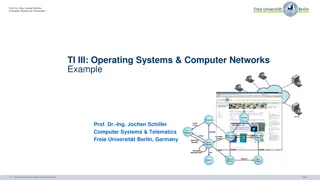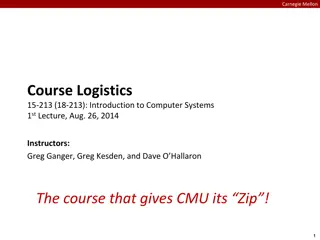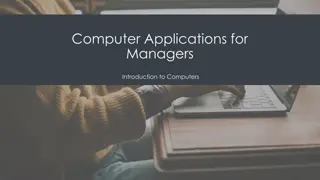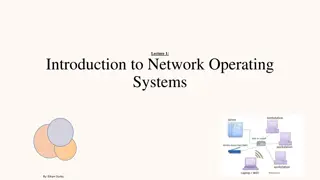Understanding Computer Organization and Architecture
A computer system is a programmable digital electronics device that processes data as per program instructions to provide meaningful output. It comprises hardware and software components, with hardware being the physical parts and software essential for driving the hardware. Computer organization fo
14 views • 71 slides
Understanding Information Systems in Organizational Management
Management in organizations is divided into three levels: operational, tactical, and strategic. Each level requires different information systems to support various activities. Operational systems focus on routine transactions and control processes, while middle-level systems aid in semi-structured
9 views • 39 slides
Analog Computer Simulation of Mechanical Oscillations with Damping
Explore the analog computer simulation of mechanical oscillations with and without damping in a physics-themed project. Students can visualize classical physics concepts through hands-on analog circuit design, modeling spring-mass systems and RLC circuits. The project involves constructing a breadbo
0 views • 11 slides
Computer Science and Business Systems (CSBS) at MKCE
Computer Science and Business Systems (CSBS) at MKCE\nWelcome to the world of Computer Science and Business Systems (CSBS) at M.Kumarasamy College of Engineering (MKCE), an avant-garde and industry-specific program designed to forge the future leaders of technology and business. Moreover, if you\u20
0 views • 2 slides
Overview of Computer Hardware Components and Software Functions
Computer hardware components such as monitor, CPU, mouse, and projector are essential physical parts of a computer system, while software includes intangible programs like operating systems and utility software. Hardware components perform tasks like displaying data, processing information, and prin
8 views • 9 slides
Understanding Computer Systems: Components and Organization
Computer systems are high-speed electronic machines that process data and instructions through hardware and software components. The elements include hardware, software, and users, with binary systems using bits and bytes to represent data. The organization of a computer involves input, CPU, memory,
2 views • 21 slides
Understanding Computer Architecture and Organization
Computer architecture and organization are fundamental aspects of computing systems. Computer architecture focuses on the functional design and implementation of various computer parts, while computer organization deals with how operational attributes come together to realize the architectural speci
3 views • 40 slides
Understanding Computer System and Organization
Computer Organization involves the logical structure of a computer, defining the interconnections of components for optimal performance. Computers process data through an Input-Process-Output cycle, with input, processing, and output units working together. The characteristics of a computer include
1 views • 20 slides
Understanding BUS Systems in Computer Architecture
This article explores the concept of BUS systems in computer architecture, focusing on the efficient transfer of information between registers using a common bus structure. It delves into the implementation of bus systems for multiple-register configurations, such as a bus system for four registers
0 views • 24 slides
Understanding Computer System Architectures
Computer systems can be categorized into single-processor and multiprocessor systems. Single-processor systems have one main CPU but may also contain special-purpose processors. Multiprocessor systems have multiple processors that share resources, offering advantages like increased throughput, econo
2 views • 25 slides
Computer Science Department Information and Courses Offered
The Computer Science Department provides information on courses offered for GCSE or BTEC qualifications, specifically focusing on the AQA GCSE in Computer Science. The course equips students with valuable thinking and programming skills essential in the modern workplace, covering key concepts and pr
3 views • 7 slides
Understanding Computer Systems and Components
Computer systems are high-speed electronic machines that process data and instructions to solve problems. They consist of hardware and software elements, with input and output devices for interaction. Key concepts include binary system, byte measurement units, hardware organization, and input hardwa
1 views • 21 slides
Computer Graphics: Evolution and Applications
Computer graphics represent the creation and manipulation of visual information using specialized hardware and software. This field has evolved since the 1950s, enabling diverse applications like entertainment, CAD, education, e-commerce, and computer art. The origins date back to MIT's early displa
1 views • 22 slides
Anatomy of a Computer System: Hardware Components and Functions
A typical computer system consists of hardware and software working together to perform various computational tasks. The hardware components include the central processing unit (CPU), input/output devices, storage units, and the motherboard. The CPU acts as the main brain of the computer, performing
6 views • 6 slides
Understanding Computer Processing Systems
Computer processing systems consist of various components such as the control unit, ALU, input unit, CPU, output unit, memory, and more. Input devices feed raw data to the computer, while output devices provide processed information. The CPU plays a crucial role in executing instructions and data pr
0 views • 13 slides
Introduction to Computer Systems: Components, Types, and Functions
This session conducted by Dr. Ebenezer Ankrah covers the essential aspects of computer systems, including hardware components, types of computer systems, and information systems. Students will gain an understanding of the fundamental principles and characteristics of computer systems, enabling them
0 views • 41 slides
**Exploring Inquiry-Based Learning in Computer Science Education**
Inquiry-based learning (IBL) in computer science classrooms focuses on fostering communication, collaboration, decision-making, and problem-solving skills among students. The approach involves students constructing knowledge through independent, active activities based on real-world experiences. How
0 views • 18 slides
Evolution of Algorithms and Computer Science Through History
The history of algorithms and algorithmic thinking dates back to ancient times, with the development of general-purpose computational machines by Charles Babbage in the 19th century marking a significant advancement. The term "computer science" emerged in 1959, encompassing theoretical computer scie
1 views • 39 slides
Overview of Computer Input and Output Devices
Input devices of a computer system consist of external components like keyboard, mouse, light pen, joystick, scanner, microphone, and more, that provide information and instructions to the computer. On the other hand, output devices transfer information from the computer's CPU to the user through de
0 views • 11 slides
Understanding Malicious Software and Its Impact on Computer Systems
Malicious software, commonly known as malware, poses a serious threat to computer systems by exploiting vulnerabilities. This content covers various terminologies, categories, and types of malware, including viruses, worms, rootkits, spyware, and adware. It also delves into how malware can cause dam
0 views • 16 slides
Understanding Computer Graphics: An Overview
Computer graphics involves creating images and animations using a computer through hardware and software systems. It has evolved significantly over the years, with advancements in generating various types of computer graphics. Learn about the basics of computer graphics, including digital image repr
0 views • 15 slides
Understanding Computer Crimes and Prevention Strategies
Computer crimes involve illegal acts utilizing computer systems, leading to various consequences. This lecture covers the types of computer system attacks, motives behind computer crimes, costs, prevention strategies, and reflection on the discussed topics. It emphasizes the increasing scope of comp
1 views • 20 slides
Understanding Storage Devices in Computer Systems
This content provides an in-depth look at storage devices used in computer systems, covering topics such as hard drives, RAID, SSDs, addressing and geometry of hard drives, disk interfaces, types of delays with disks, and how to calculate transfer time. It explores the components, functionalities, a
0 views • 62 slides
Importance of Time in Computer Systems
Computer systems rely on accurate and stable timekeeping for various functions such as event scheduling, security certificates, and synchronization. Maintaining precise time is essential for ensuring proper system operations and data integrity. Challenges like temperature fluctuations and voltage ch
0 views • 22 slides
Information Systems in Organizations: Overview and Implementation
Information systems play a crucial role in organizations, encompassing transaction processing systems, functional area information systems, and enterprise resource planning systems. This content delves into the purpose of transaction processing systems, the support provided by information systems ac
0 views • 30 slides
Understanding Descriptor Tables and Registers in Computer Systems
Descriptor tables in computer systems group segment descriptors together for efficient memory management. They consist of Global Descriptor Table (GDT), Local Descriptor Table (LDT), and Interrupt Descriptor Table (IDT). The Global Descriptor Table (GDT) is a crucial table that is shared by all prog
0 views • 18 slides
Understanding Computer Systems and Programming Basics with JAVA
Introduction to computer systems, hardware, software, and different components like CPU, main memory, secondary memory devices, input/output devices, operating systems, and analog vs. digital data. Exploring the essential elements required for computer programming with examples and visuals.
0 views • 32 slides
Understanding COSC121: Computer Systems and Assembly Language Programming
Delve into the world of COSC121 led by Assistant Teaching Professor Jeremy Bolton, PhD. Explore essential topics in computer systems, assembly language programming, and hardware design. Get hands-on experience with programming in LC-3, understanding machine language, and writing assembly code. Enhan
0 views • 29 slides
Introduction to Computer Systems - COMP.321 Overview
This course provides an in-depth understanding of computer systems, focusing on programming, exceptions, memory, I/O, networking, and system classes. Students learn about computer architecture, compilers, operating systems, and security. With a blend of theory and practical applications, the course
0 views • 21 slides
Understanding Computer Systems Architectures and Standards
Open systems, standards, client-server models, and internet functionality are crucial components of computer systems architectures. Open systems promote interoperability, standards ensure technical criteria, client-server models define coordination, and the internet provides a communication infrastr
0 views • 34 slides
Understanding Operating Systems: An Introduction and Overview
An operating system is a crucial program that manages computer hardware and serves as an intermediary between users and hardware. This chapter explores the role of operating systems in a computer system, covering components like hardware, application programs, and users. It delves into how operating
0 views • 16 slides
Understanding ICT Systems in Everyday Life
Explore the basic components of a computer system, including the processor, internal memory, input/output devices, and storage, with a focus on how computer systems function in daily life. Learn about computer monitors, the role of operating systems, RAM and ROM memory types, cache memory, and how c
0 views • 130 slides
Overview of Computer Science at Al Mustaqbal University College of Dentistry
Al Mustaqbal University College of Dentistry offers courses in computer science, covering topics like data reception, processing, storage, and output. The curriculum includes the study of computers as electronic devices, data and information, computer features, operating systems like Windows, and ta
0 views • 10 slides
Understanding Computer Networking Basics and Distributed Systems
Computer networks facilitate the sharing of devices and resources like servers, clients, and data, while distributed systems involve components located on different networked computers communicating to achieve common goals. Types of computer networks include LAN, PAN, MAN, and WAN. Distributed syste
0 views • 17 slides
Understanding the Essence of Computer Science and Computational Thinking
Delve into the fundamentals of Computer Science and Computational Thinking through chapters discussing the nature of science, predictions in physics, and the distinction between Computer Science and Computer Information Systems. Explore the relationships between Math, Physics, and Computer Science i
0 views • 29 slides
Overview of Prof. Dr.-Ing. Jochen Schiller's Computer Systems & Telematics
This content discusses various aspects of computer systems and telematics as taught by Prof. Dr.-Ing. Jochen Schiller at Freie Universität Berlin, Germany. It covers topics such as operating systems, computer networks, network security, and examples illustrating key concepts. The content explains p
0 views • 31 slides
Understanding Embedded Systems and Cyber-Physical Systems
Embedded systems are specialized computer systems embedded within larger systems, such as control systems and car controllers. This lecture covers real-time aspects, applications of Cyber-Physical Systems (CPS), and examples like the Boeing 777/Airbus A380 cockpit. It discusses the design process of
0 views • 22 slides
Carnegie Mellon Course Logistics: Introduction to Computer Systems
Carnegie Mellon University offers the course 15-213: Introduction to Computer Systems, taught by instructors Greg Ganger, Greg Kesden, and Dave O. Hallaron. The course covers essential topics in computer systems and programming, emphasizing practical skills through lectures, labs, and exams. Recomme
0 views • 23 slides
Understanding Computer Applications for Managers
This educational material introduces computer applications specifically tailored for managers, covering basic functions, operating systems, program navigation, file management, and more. It delves into essential computer concepts, hardware components, software systems, security measures, efficiency
0 views • 39 slides
Overview of Network Operating Systems and Their Features
Network operating systems are essential software that manage computer resources and provide services for programs. This lecture covers the types of computers in a network, features of operating systems such as process and memory management, disk and file systems, and networking capabilities. Underst
0 views • 27 slides


